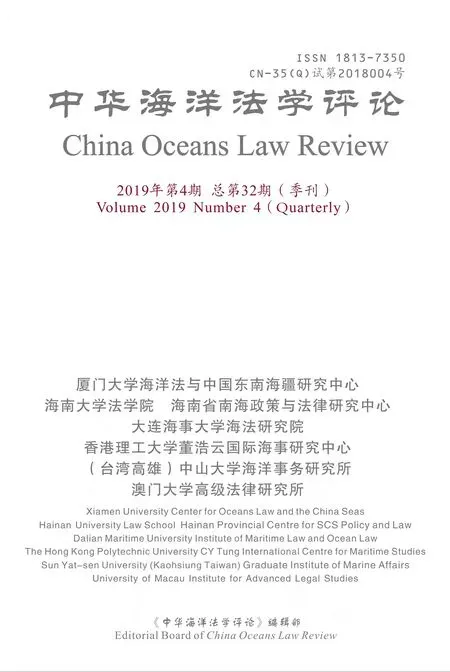EDITOR’S NOTE
With the publication of this Issue,we have completed a series of celebrations for the 15th anniversary:in addition to holding the National Graduate Dissertation Competition on“Retrospect and Prospect of the 25th Anniversary of the Entry into Force of the UNCLOS”at Xiamen University,we also held an academic seminar and a joint working meeting of all cooperating units at Hainan University.At the end of this Issue,the cumulative index from 2005 to 2019 is attached to facilitate readers to review and search for the insightful discussions of our previous authors.
China Oceans Law Review (COLR or 中華海洋法學(xué)評(píng)論)was originally named 中國(guó)海洋法學(xué)評(píng)論 in Chinese.Dr.FU Kuen-chen,as a well-known scholar in China and abroad in the field of international law of the sea,came from Taiwan to teach in Xiamen University on 12 January 2001.In 2005,basing on the concept of“Greater China”and“Greater Sea Law”,he founded COLR in Hong Kong and Xiamen as an academic journal with an international standard serial number.At the beginning,Prof.FU,the self-appointed editor-inchief,worked together with eight postgraduate students with painstaking efforts to run the journal.At that time,COLR got limited financial support only from Mr.CHEN Xianzhong,a patriotic overseas Chinese living in the United States,who bought 50 copies or more from COLR every time when it was published.Warm support was also given by the cooperative universities in Hong Kong,Taiwan and Macao.Beginning from 2007,COLR has been funded by Xiamen University at an annual rate of 50,000 RMB.In 2016,Prof.FU’s application for COLR to be qualified as a core journal (Class II)of humanities and social sciences in Xiamen University was approved with unanimous vote.After 14 years of publication,COLR was officially authorized a domestic CN serial number by Fujian Province in 2019.At the suggestion of relevant experts,the Chinese name of COLR was officially changed to 中華海洋法學(xué)評(píng)論.And the publish frequency has changed from semi-annually to quarterly.As a Chinese-English bilingual academic journal,COLR will continue providing academic information for professionals in the field of international law of the sea at home and abroad.
The current Issue presents our audience with topics on:(a)the South China Sea (SCS)Arbitration and historic rights of China in the SCS;(b)criminal regulations for marine ecological environment protection;(c)the knock-forknock principle in offshore support vessels (OSVs)chartering;(d)the legal status of unmanned ships.
In the previous Issue,Prof.FU Kuen-chen pointed out that the SCS Arbitration Tribunal misinterpreted China’s claims for historic rights in the SCS.In this Issue,Prof.FU argues that the absurd“Mosquito Logic”of the Award causes havoc to international rule of law and rebuts the flaws in the hasty verdict of the Tribunal.
Oceans are an essential component of the Earth’s ecosystem.Marine ecological environmental protection has become increasingly important.The conclusion and amendments of the Marine Environment Protection Law of the People’s Republic of China have embodied the great attention that China attaches to the protection of marine ecological environment.Mr.HU Gongshu,a prosecutor,states that,concerning the protection of the coastal ecological environment,the pollution levels in coastal cities deserve much more attention.Mr.HU shares his insights of criminal regulations for marine ecological environmental protection based on judicial practice concerning the crimes of environmental pollution.
The SUPPLYTIME 2017,a revised version of the standard time charter party for OSVs launched by the Baltic and International Maritime Council(BIMCO),contains several changes,based on SUPPLYTIME 2005,especially in the knock-for-knock clauses embodied in Clause 14(a).Mr.HAN Yunfei,a judge assistant,through reviewing the history of the knock-for-knock clauses,analyzing relevant legal precedents in British judicial practice,and comparing the SUPPLYTIME 2005 with the SUPPLYTIME 2017,makes it clear that the knock-for-knock clauses of SUPPLYTIME 2017 shall not be boldly used nor unreasonably resisted or excluded.
This Issue,last but not least,includes an award-winning article of the essay competition organized by COLR Editorial Board to mark the 25th anniversary of the entry into force of the United Nations Convention on the Law of the S ea (UNCLOS),by Ms.LI Rui.Due to the rise of unmanned technology,the legal status of unmanned ships has triggered discussion.Ms.LI analyzes the international conventions that are closely relevant to“ships”in her paper and aims to cast some light on relevant legal status that unmanned ships may face.
- 中華海洋法學(xué)評(píng)論的其它文章
- 2016 南海仲裁案仲裁庭對(duì)中國(guó)南海歷史性權(quán)利的錯(cuò)誤認(rèn)定(下)
- Misattribution of China’s Historic Rights to the South China Sea by the 2016 South China Sea Arbitration Tribunal (Part II)
- 海洋生態(tài)環(huán)境保護(hù)的刑事規(guī)制
——基于Y 市污染環(huán)境罪的司法實(shí)踐 - On Criminal Regulations for Marine Ecological Environment Protection:Based on the Judicial Practice of the Crime of Environmental Pollution in City Y
- 無(wú)人船的法律地位研究
- On the Legal Status of Unmanned Ships

